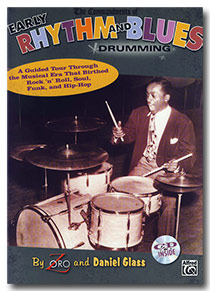|
|
Early R&B never sounded more down and dirty than in Chicago during the '50s. Artists like Muddy Waters, Sonny Boy Williamson, and Howlin' Wolf all came to Chicago from the deep South, and their approach to the blues differed greatly from the swing-based jump of Louis Jordan or the pop-oriented sound of other '50s R&B. Muddy, the Wolf and other country bluesmen followed their own set of rules, and were not necessarily concerned with slick horn arrangements, elaborate chord progressions or even following a strict 12-bar format. Their concept of the blues was based on a feeling-primitive, driving, relentless and hypnotic. Songs were often improvised on the spot or changed from night to night depending on the artist's mood.
The "Double Shuffle" - so called because both hands are pumping out the shuffle feel at the same time. Odie Payne was a master of this groove, and you can hear it to great effect on Chuck Berry's classic "No Particular Place To Go" |
from:
thanks for your visit!
CLICK:
the 500 Top Drummers:
the 500 Top Drummers:




